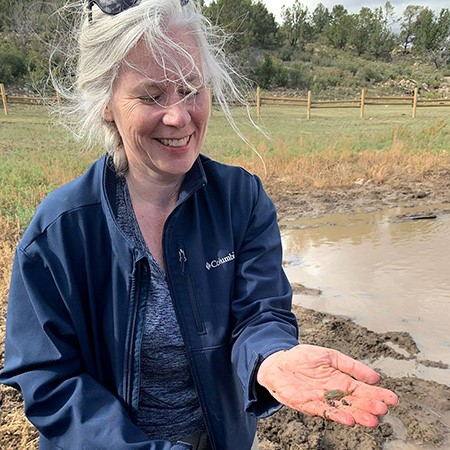Dr. Kerry Griffis-Kyle
Email: kerry.griffis-kyle@ttu.edu
Phone: (806) 834-2619
Office: Goddard Hall 202B
Ph.D., Syracuse University, 2005
Lab Website
Research Interests
My research program addresses questions related to biodiversity and conservation. Much of my lab's work is focused on evaluating how anthropogenic stressors, including climate change, are affecting wetlands, wetland dependent species, and other sensitive natural resources and how we can modify our management strategies to mitigate for these issues. I use interdisciplinary approaches to address management driven research questions in arid and semi-arid regions. Work from my lab combines basic and theoretic approaches; integrating population ecology, landscape ecology, animal behavior, and conservation biology to address research questions on a variety of taxa ranging from invertebrates and amphibians to birds and mammals.

Current projects include:
- Management of isolated wetlands and water developments for wildlife biodiversity.
- Conservation planning including connectivity evaluations and vulnerability assessments
- Water quality and effects on populations and connectivity of populations
- Desert herpetology.
Courses Taught
- NRM 2307 Diversity of Life
- NRM 3407 Wildlife Techniques
- NRM 4301 Tropical Avian Ecology
- NRM 5307 Wetland Ecology
Recent Publications
Ansley, R.J., V.H. Rivera-Monroy, K.L. Griffis-Kyle, B. Hoagland, A. Emert, T. Fagen, S.R. Loss, H.R. McCarthy, N.G. Smith, E.F. Waring. 2023. Assessing impacts of climate change on selected foundation species and ecosystem services in the South-Central USA. Ecosphere 14(2): e4412. https://doi.org/10.1002/ecs2.4412
Sutor, S, N.E. McIntyre, K. Griffis-Kyle. 2023. Characterizing range‑wide impacts
of anthropogenic barriers on structural landscape connectivity for the Sonoran desert
tortoise (Gopherus morafkai). Landscape Ecology https://doi.org/10.1007/s10980-023-01649-3
Emert, A., S. Subbiah, F.B. Green, K.L. Griffis-Kyle, P.N. Smith. 2023. Atmospheric deposition of particulate matter from beef cattle feedlots is a likely contributor of pyrethroid occurrence in isolated wetland sediment: source apportionment and ecological risk assessment. Environmental Pollution 316: e120493. https://doi.org/10.1016/j.envpol.2022.120493
Gary, D., K. Mougey, N.E. McIntyre, K.L. Griffis-Kyle. 2019. Identification of hotspots of at-risk terrestrial vertebrate species in the south-central Great Plains of North America: A tool to inform and address regional-scale conservation. Journal for Nature Conservation 50: Article 125684. https://doi.org/10.1016/j.jnc.2019.01.002
Griffis-Kyle, K.L., K. Mougey, M. Vanlandeghem, S. Swain, J. Drake. 2018. Comparison of climate vulnerability among desert herpetofauna. Biological Conservation 255: 164-175. https://doi.org/10.1016/j.biocon.2018.06.009
Kiesow, A.B., and K.L. Griffis-Kyle. 2017. Desert amphibian selection of arid land breeding habitat undermines reproductive effort. Oecologia 185: 619-627. https://doi.org/10.1007/s00442-017-3969-2
Drake, J., K.L. Griffis-Kyle, N.E. McIntyre. 2017. Graph theory as an invasive species management tool: Case study in the Sonoran Desert. Landscape Ecology 32: 1739-1752. https://doi.org/10.1007/s10980-017-0539-2
Griffis-Kyle, K.L. 2016. Physiology and ecology to inform climate adaptation strategies for desert amphibians. Herpetological Conservation and Biology 11: 563-582. http://www.herpconbio.org/Volume_11/Issue_3/Griffis-Kyle_2016.pdf
Department of Natural Resources Management
-
Address
Goddard Building, Texas Tech University, Box 42125, Lubbock TX 79409 -
Phone
806.742.2841 -
Email
nrm@ttu.edu
